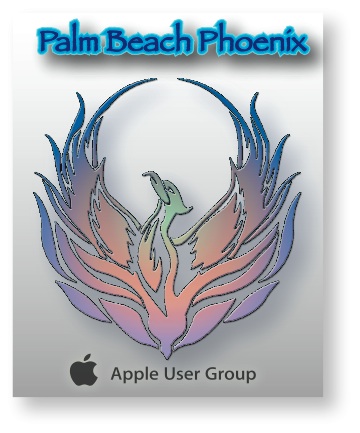Mac Corner: Viruses and Other Bad Things — a Mac Problem?
By Larry Grinnell, Palm Beach Phoenix Apple Users Group
 Windows PC users are used to worrying about the latest virus, worm, spyware, or malware attack to their computer. It seems like there's a new attack every day. One of the biggest selling points of Macintosh computer ownership is the perceived lack of viruses and malware problems. The question whether Macs really are invulnerable to all this nastiness is one I hope to answer today.
Windows PC users are used to worrying about the latest virus, worm, spyware, or malware attack to their computer. It seems like there's a new attack every day. One of the biggest selling points of Macintosh computer ownership is the perceived lack of viruses and malware problems. The question whether Macs really are invulnerable to all this nastiness is one I hope to answer today.
First, what does malware do? Malware travels from infected websites or email to your computer, where it then attempts to find other computers to infect, often using your own email address book to spread itself.
One popular variant is the spambot. A spambot is a piece of malware that spreads in the usual way, but is then controlled by a "master" computer, usually located in Eastern Europe, Russia, or China, that directs every computer under its control to send out spam email. Spambot creators sell their services to the highest bidder. Spambots slow down your computer, and most are so ingeniously designed that they are nearly impossible to detect and therefore difficult to eradicate.
So, are Macintosh computers really invulnerable to attacks to the operating system by viruses and all the rest? The short answer is yes — but with qualifications.
No computer is completely invulnerable to attack. This has created a huge market opportunity for anti-virus and related software products. There are numerous companies out there making a ton of money selling these products in the Windows PC marketplace. Macintosh computers, due to fundamental differences in the operating system design, are less vulnerable to attack. I recently purchased some utilities that included an anti-virus component, and the salesman at the AppleStore in Wellington incorrectly advised me that Macs were invulnerable and I shouldn’t waste my money on virus protection.
MacOS X (spoken as "Mac Oh Ess Ten") avoids nearly all virus and malware attacks because of its near-invisibility. With a market share of less than 5 percent, Macs are under the hackers' radar — not worth the effort of writing software for a completely different operating system that makes up such a tiny piece of the personal computer universe.
That used to be the case. Now, market share numbers are way up, in particular Apple's laptop line. Market share on new laptop sales is approaching 10 percent, thus beginning to make it more attractive to virus and malware writers.
So far, only a very few pieces of MacOS X malware have been seen in the wild, but most require active involvement by the user to be activated. The user is prompted to install something, and the user says "OK", followed with a prompt to enter the administrator password to authorize the installation.
This is the most likely way to infect a Macintosh, though I'm sure the malware authors out there are working on new and more secretive ways of infecting your Mac. There are anti-virus products from Intego, Symantec, and a few others for the Mac platform, and it really isn't a bad idea to have some protection.
Finally, someone asked me about virus vulnerability to Microsoft Windows when working in a virtual setting, using programs like Parallels or VMWare Fusion. The bottom line is the Windows operating system is nearly as vulnerable to attack as a standalone PC running the same operating system.
The virtual environment does take advantage of the Macintosh firewall, but that isn't enough. When web surfing, Windows-specific viruses are not detected by the Mac operating system, so will pass through to Windows. It's seems appropriate to note that VMWare Fusion even comes bundled with the McAfee anti-virus product with a one year subscription to the updater files. Parallels comes with the Kapersky anti-virus software solution.
Another solution I like is the Intego dual-protection solution that has components for the Mac OS and bundles the top-rated BitDefender product for Windows. Well worth the price.
Mac Corner appears every Wednesday. Last week's column can be found here.
About Larry Grinnell: Larry has been working with Macintosh and Windows PCs for over 25 years and worked as a senior technical writer and IT support professional for a major midwest-based consumer electronics and telecommunications equipment manufacturer here in South Florida. Click here to reach him by email.
 Writers of this column are members of the Palm Beach Phoenix Apple User Group, a nonprofit organization for Apple Computing Device Users, recognized by Apple Inc., with the purpose of providing educational training and coaching to its members (students, professionals and seniors alike) in a cordial social environment. Click here to visit their website. Click here to reach them by email.
Writers of this column are members of the Palm Beach Phoenix Apple User Group, a nonprofit organization for Apple Computing Device Users, recognized by Apple Inc., with the purpose of providing educational training and coaching to its members (students, professionals and seniors alike) in a cordial social environment. Click here to visit their website. Click here to reach them by email.

